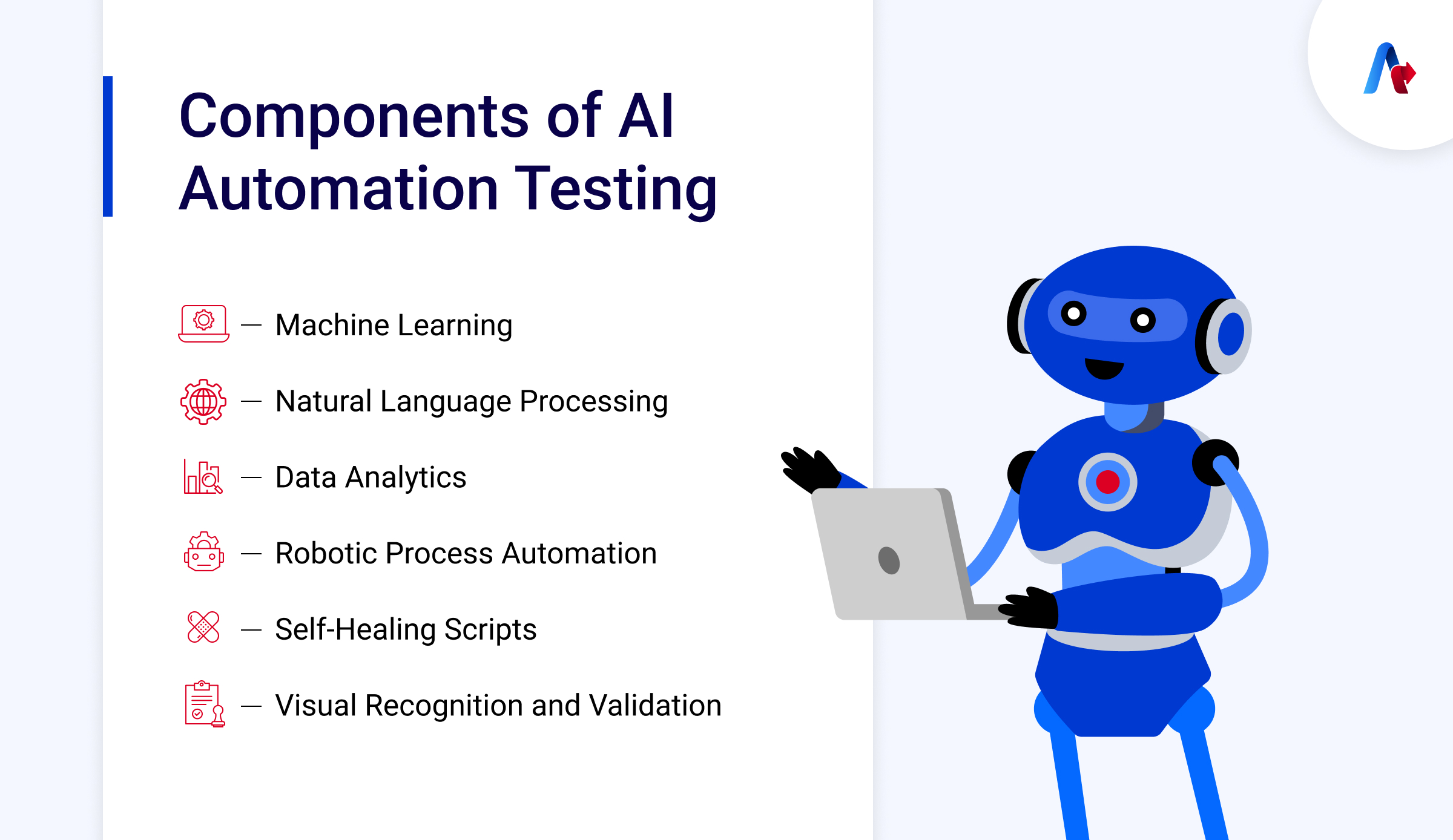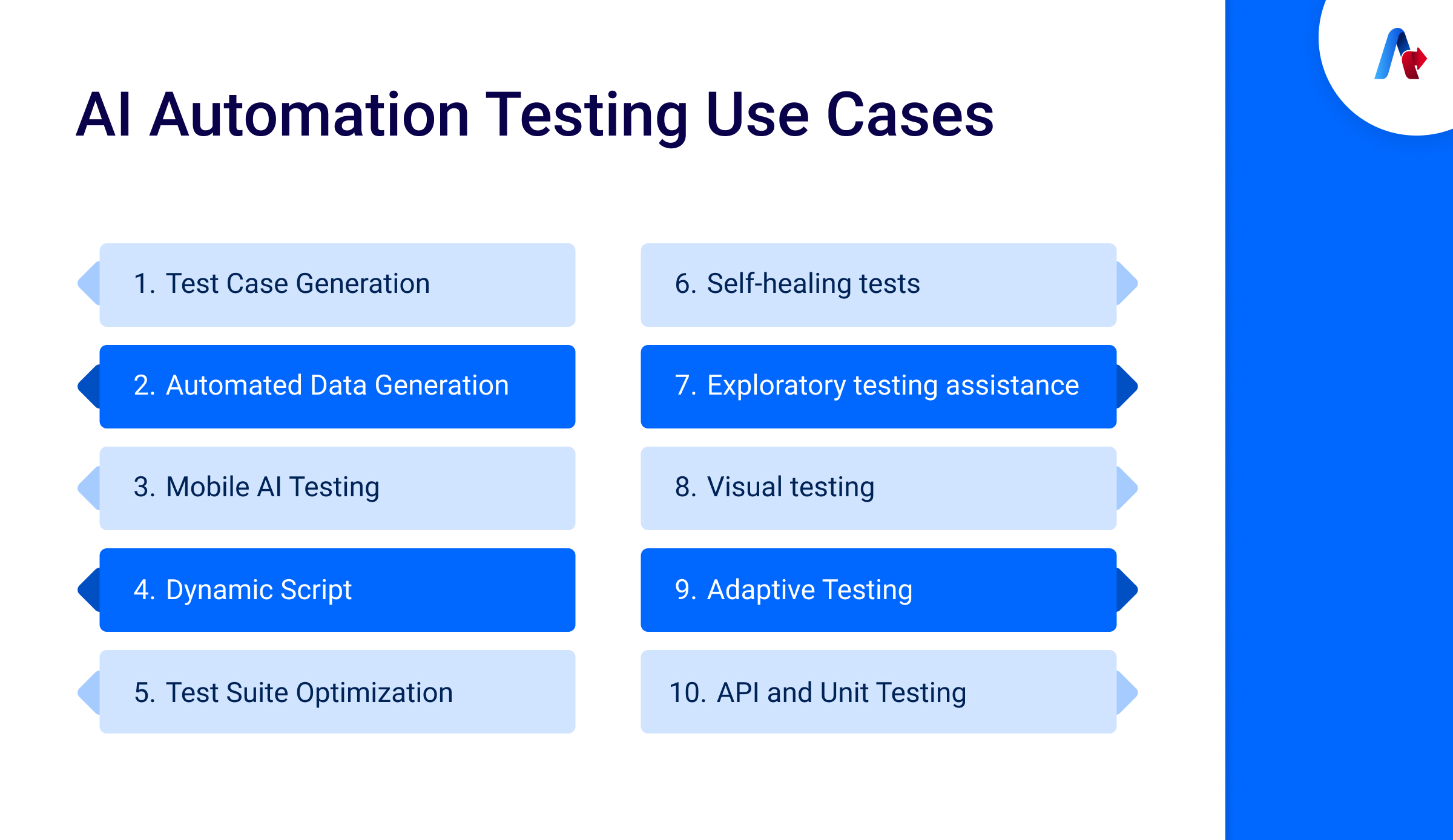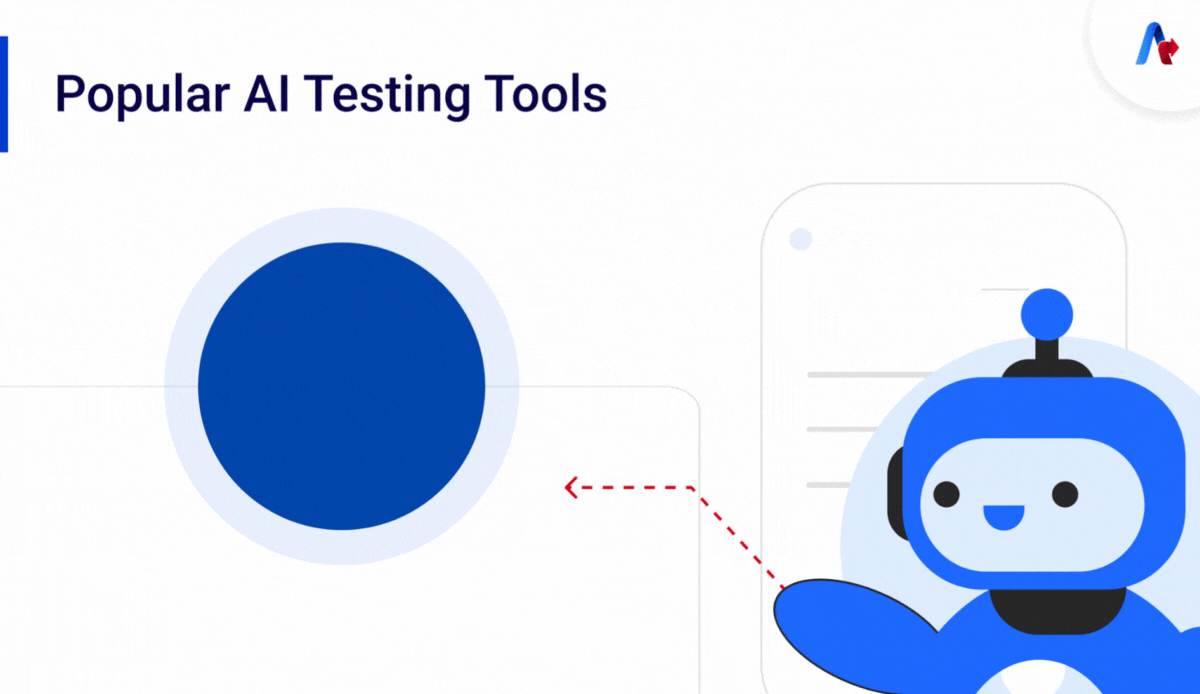AI in Test Automation
BLOG
In a world where speed and precision are the most critical factors, conventional testing methods cannot keep up with the pace of modern software development. Enter AI in automation testing—it is a transformative approach that restructures how businesses ensure software quality. Unlike conventional testing, AI-enabled automation can adapt, learn and evolve in real time, making testing processes fast, smart and resilient.
When we think of AI tools, ChatGPT and Google Gemini come to mind. However, AI is not confined to these; instead, it is evolving quickly, changing the business and technology landscape. The introduction of intelligent test automation helps businesses predict failures, automate mundane tasks and ensure smooth software delivery.
This innovation resonates with agile and DevOps workflows, ensuring faster releases without compromising quality.
This blog articulates the components, benefits, challenges and future of AI in QA automation, providing valuable insights for enterprises to evolve in this fast-paced digital landscape.
What is AI Test Automation?
AI test automation is a revolutionary approach to software testing. It uses a combination of Artificial Intelligence and machine learning algorithms to create, execute and manage test cases. This differs from traditional test automation, as AI-based testing systems can analyze patterns, learn from previous test cycles and make real-time script adjustments.
The main point of difference is its self-healing capability, which utilizes intelligent test automation. This minimizes the requirement for manual intervention and enables faster and more accurate testing.
In simplest terms, AI-enabled automation tools can track changes in the user interface, update test scripts automatically and detect defects even before they influence the software. This is a prerequisite for the agile and DevOps environments, where rapid software releases are the norm.
AI tools can automatically retrieve data, perform tests and detect bugs without the need for human guidance or help. According to Grand View Research, The Global AI-enabled testing market was valued at around USD 414.7 million in 2022 and is expected to grow at a CAGR of 18.4% from 2023 to 2030.
What Are the Benefits of AI in Test Automation?
| Aspect | Scenario | Benefit |
|---|---|---|
| Self-healing Test Scripts | UI/UX alterations during app updates. | Self-healing scripts can automatically adapt to UI changes, minimizing the need for maintenance efforts and manual intervention. |
| Faster Test Execution | Testing large scale applications with different test cases. | 30 to 50% faster test cycles with AI enabled testing, ensuring continuous execution of test cases. |
| Test Case Optimization and Prioritisation | Managing thousands of test cases for enterprise applications. | AI algorithms emphasize critical test cases, saving resources and enabling focus testing on high and areas. |
| Automated Regression Testing | Testing new software patches that require regression testing. | Automatic regression testing enables validation, leading to faster releases and less errors in production. |
| 24/7 Continuous Testing | Testing in CI/CD environments with rapid delivery cycles. | Continuous testing resonates with agile workflows helping in uninterrupted development and software delivery. |
| Enhance Test Coverage and Edge case Detection | Testing complex and multivariable applications with several test scenarios. | AI generates additional test scenarios, increasing test coverage and ensuring robust software performance. |
| Defect Prediction and Early Bug Detection | Identification of potential defects before production releases. | Predictive Analytics enables tracking high risk areas, allowing teams to mitigate issues before production. |
Ready to transform your testing process with AI? Let's discuss your needs.
Contact UsComponents of AI Test Automation

- Machine Learning: ML models can process historical data, track patterns and predict potential errors, leading to more intelligent test case prioritization and proactive issue detection.
- Natural Language Processing: NLP enables the creation of plain language test scripts, which are converted into executable test cases by AI tools. This makes it easier for non-technical stakeholders to collaborate with development teams.
- Data Analytics: Advanced Analytical Tools can process vast data sets to understand performance trends, relevant issues and areas demanding improvement. AI-based data allows us to make better decisions and enhance testing accuracy.
- Robotic Process Automation: Robotic Process Automation (RPA) automates repetitive tasks like data entry, environment setup and report generation, allowing testers to check on strategic activities.
- Self-Healing Scripts: AI can automatically update scripts when the UI or codebase changes, minimizing maintenance efforts.
- Visual Recognition and Validation: AI-driven image recognition helps ensure layout consistency and detect visual anomalies in highly descriptive UIs.
AI in Automation Testing Use Cases

Automation Testing continuously transforms software quality assurance and insurance into faster and more efficient testing processes. Here are 10 detailed use cases where AI in test automation is creating a significant impact:
1. Test Case Generation
AI tools automatically generate test cases based on system specifications and historical test data and use stories. Algorithms monitor possible paths and identify edge cases that manual testing cannot cover. This approach enhances coverage and reduces manual effort.
2. Automated Data Generation
AI-based test automation tools like UiPath generate realistic and vast data sets to simulate various scenarios, comprising extreme and edge cases. For instance, AI can create customer profiles to test personalized E-Commerce experiences.
3. Dynamic Script
AI in QA automation generates test scripts that can evolve with the application. Tools like UiPath, Tricentis and QAcomplete automatically update scripts when application interfaces change, minimizing the requirement for manual intervention.
4. Adaptive Testing
AI tools can recognize alterations in UI and behavior and dynamically update test scripts. This minimizes maintenance overheads in agile environments where frequent updates occur. UiPath Test automation is an excellent example, as it uses object recognition and self-healing scripts.
5. Self-Healing Tests
If an application is altered, AI can sense the change, updating test scripts and healing broken tests automatically. Tools like the UiPath Test Automation suite and Atlassian support self-feeling features, making testing more resilient.
6. Exploratory Testing Assistance
AI suggests edge cases, potential defects and new testing paths for testers to explore. Generative AI utilizes combinations of inputs, allowing for more exhaustive testing of unknown cases.
7. Mobile AI Testing
AI models, including Convolutional Neural Networks, can analyze UI and user interactions in mobile applications. It tracks down layout inconsistencies and performance issues to accelerate mobile testing.
8. Visual testing
AI-driven visual testing tools can analyze screen elements and check for layout transitions, image misalignments and incorrect colors. They also investigate visual validation, ensuring pixel-perfect user interfaces.
9. Test Suite Optimization
AI analyzes historical test data to identify flaky or infective tests. This helps determine which test should be run, speeding up the testing process and saving resources.
10. API and Unit Testing
AI-based tools enhance API testing by streamlining test cases and validating API endpoints. Based on API test automation, analyze system errors and help testers optimize test suites.
The potential of AI in performance testing, end-to-end testing, unit testing, and compatibility testing is just starting to be explored. AI will continue evolving, and its impact on QA productivity will grow significantly.
AI still requires human understanding for comprehensive software quality assurance; however, the future of test automation is dependent on the collaboration between AI technology and human expertise, specifically in enterprise-level testing that covers multiple platforms and applications.
Challenges and Considerations in Using AI for Automation Testing
While AI-enabled test automation offers significant benefits, some challenges need to be addressed for successful implementation.
- Complexity of Implementation: AI in test automation requires advanced setup and integration with existing systems. Most organizations face difficulty selecting AI tools according to the requirements, leading to longer implementation times.
- High Initial Investment: The initial expenses of setting up AI automation testing are quite high. Despite long-term savings in efficiency improvements, enterprises might hesitate to invest in AI Technology.
- Data Quality and Availability: Machine Learning systems require large amounts of high-quality data for training. For instance, inaccurate or incomplete data might lead to incorrect predictions and infective data management practices. Enterprises might risk the effectiveness of their AI, given automation efforts in case of less-quality data.
- Skill Shortage: A shortage of skilled professionals who can implement and monitor AI-given automation tools. According to a report by PwC, 60% of businesses struggle to find employees with the proper knowledge of AI for automation.
- RO Change: Employees are accustomed to using traditional testing methods and might hesitate to accept the shift to AI-enabled testing mechanisms.
Want to know how AI can enhance your test automation strategy?
Contact Us TodayThe Future of AI/ Machine Learning in Test Automation
The future of AI in test automation is promising. It will continue to redefine software testing processes. With advancements in AI Technology, the need for large testing teams will disappear. AI-driven tools have the capability to identify potential problems before they escalate, allowing predictive maintenance and early bug detection. This approach maintains software quality by mitigating errors even before they appear in the code.
Machine learning models are evolving, and their ability to learn from historical data will help improve the accuracy of defect prediction, as always. With each test cycle, AI tools will be adapted to detect complex patterns and dependencies, enhancing test coverage. This will just make automation easier and smarter, reducing manual intervention and streamlining testing efforts.
The shift towards intelligent test automation is resonant with the growing demand for faster and more reliable software deployment. According to Customer Think, companies adopting a given automation can reduce testing cycles by 40%, saving resources and boosting efficiency.
Overview of Popular AI Testing Tools

These AI automation tools make a change in your Automation Testing journey, depending upon the suitability of your business.
1. UiPath Test Automation Suite
UiPath is a leading AI and RPA tools offering test automation capabilities. With UiPath, users can automate both manual and automated testing processes highlighting its wide support for different domains.
Key features:
- RPA Based Test Automation: It helps businesses to automate mundane and manual Testing activities, streamlining the entire testing life cycle.
- Integration Capabilities: It can be integrated with web, enterprise applications and desktop, making it compatible for multiple testing requirements.
- AI Powered Test Automation: By combining AI and machine learning, UiPath can optimize and improve test cases continuously based on former outcomes, ensuring that tests are adaptive and accurate.
- End to End Automation: UiPath has a comprehensive set of tools that can address all components of automation starting from creating test cases to executing them and managing the results.
Related Read: Testing Made Easy with UiPath Studio for Diverse Applications
2. Selenium
Selenium is an open source, browser automation tool, mainly used for web application testing. It enables the testers to write scripts in different programming languages including Java, python and Ruby to automate interactions with wave applications.
Key features:
- Cross Browser Testing: It supports all major browsers comprising Chrome, Firefox, Safari, Edge and Internet explorer, making it usable for cross browser testing.
- Grid Testing: Selenium Grid allows running tests in parallel across different machines, which reduces testing time significantly.
- Support for WebDriver: Selenium WebDriver enables direct communication with browser, that provides more authority over the behavior of browser in comparison to other versions.
3. Postman
Postman is a popular tool used for API testing and automation. It makes the process of testing API simple by providing an easy user interface to create, manage and execute API requests.
Key features:
- API Request Builder: It enables users to create API requests with different HTTP methods like, GET, PUT, POST and DELETE.
- Automated Testing: It helps in creating test scripts for automated testing of APIs, ensures that API responses are able to meet the expected criteria.
- Mock Servers: With this tool, you can simulate API end points before it is built, ensuring earlier testing in the development cycle.
- API Documentation: It can automatically generate and maintain updated API documentation, making it shareable with stakeholders.
4. Apache JMeter
Apache JMeter is an open-source tool for performance testing and load testing of web applications, APIs and databases. It enables multiple users to test the performance and scalability of applications.
Key features:
- Load Testing: It can simulate a high number of users to test how a system performs under peak times, helping to identify performance bottlenecks.
- Support for Multiple Protocols: It supports different protocols like HTTP, FTP, JMS and more, making it significant for testing different types of systems.
- Comprehensive Reporting: It provides insightful graphical reports in Analytics, demonstrating how the system performs and the areas of improvement.
- Extensible: It supports plugins, allowing tests to add extra functionalities like advanced metrics or incorporation with other tools.
5. Tricentis Tosca
Tricentis Tosca is a comprehensive test automation tool that facilitates continuous testing and DevOps workflows. It utilizes model-based testing to automate end to end testing across mobile, web, API and enterprise solutions.
Key features:
- Model Based Test Automation: It replaces scripts with reusable models, which supports non-technical users to create tests with minimum coding.
- Cross Platform Testing: It supports web, mobile and API testing to create a unified approach for automation.
- API Testing: It enables testing of REST, SOAP and API protocols.
- Risk Based Testing: It emphasizes testing efforts based on risk which helps businesses to prioritize areas with the most impact.
6. Cucumber
Cucumber is an open-source test automation framework that runs on the principle of Behavior Driven Development. It uses Gherkin to write human readable test scenarios.
Key features:
- Gherkin Syntax: It enables to write test scenarios in plain, "Given, When Then" language, which makes it easy for non-developers to understand.
- Cross Platform Support: It facilitates web, mobile applications and desktop for end-to-end testing.
- Integration with Testing Tools: It can be operated with Selenium, Appium and other automation tools for better testing coverage.
- Collaborative Development: It helps developers, testers and business take holders to collaborate on defining requirements and test cases.
Multi language support: It can support programming languages including Java, JavaScript, Ruby and Python.
Related Read: How to Migrate Legacy Test Cases to Low Code Platforms with Cucumber Test Automation
Begin your AI-powered journey toward smarter, faster testing today.
Connect with our experts todayTransform Your Testing Strategy with AI-Powered Automation
AI-driven test automation transforms software testing, providing reduced maintenance and higher accuracy—the intelligent test automation solutions by Accelirate optimize testing for web, mobile and API applications. Through the integration of AI, enterprises can automate mundane tasks, enhance test coverage and include self-healing scripts.
Accelirate transforms organizations with personalized automation frameworks, allowing efficient and cost-effective testing. Partnering with Accelirate allows enterprises to embrace futuristic QA processes, enhancing software quality and accelerating digital transformation.


